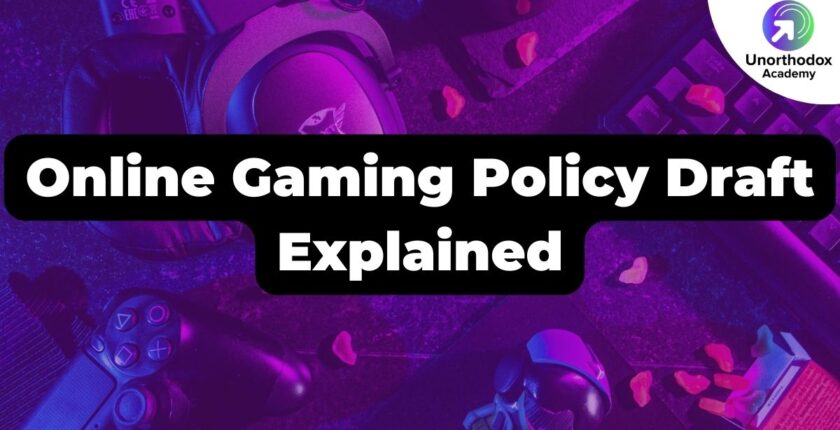New Article
Unorthodox Academy > New Article > Indian Nation and State Current Affairs > Online Gaming Policy Draft Explained
Online Gaming Policy Draft Explained
- January 5, 2023
- Posted by: Admin
- Category: Indian Nation and State Current Affairs Current Affairs MPPSC State PSC Exams
No Comments

Online Gaming Policy Draft Explained
Draft Rules for Online Gaming, an update to the Information Technology (Intermediary Guidelines and Digital Media Ethics Code) Rules, 2021, have been made public by the Ministry of Electronics and IT (MeitY). The goal of these proposed regulations is to control the Indian online gaming market and provide players with a secure and ethical gaming environment.
The Draft Rules: A Summary
- Self-Regulatory Body: Online gaming enterprises in India would be obliged to register with a self-regulatory authority. Only games that have received this organization’s approval will be able to legally function in the nation. Five directors from a variety of disciplines, including online gaming, public policy, IT, psychology, and medicine will make up the board of the self-regulatory agency. There may be more than one self-regulatory organization, in which case each one must notify the government of the games it has authorized for registration and provide a report outlining the requirements for doing so.
- Compliance: Online gaming platforms will also need to designate a compliance officer, much like social media and e-commerce businesses, to make sure that the platform is adhering to all pertinent rules and regulations. They must also choose a grievance officer to handle customer complaints and a nodal person to serve as a point of contact for the government and help law enforcement.
- Due Diligence: Online gambling companies will also need to take additional due diligence steps, like KYC (know your customer) checks for users, open withdrawal and refund policies, and equitable winning payouts. These businesses will have to adhere to the Reserve Bank of India’s guidelines for KYC checks (RBI).
- Random Number Generation Certificate and No Bot Certificate: Gaming companies will be required to obtain a Random Number Generation Certificate, which is commonly used by card game platforms to verify that game outputs are random and unexpected. Additionally, they will require a “no bot certificate” from a reputable certifying organisation, which will attest to the platform’s lack of bots or automated processes.
- Restrictions on Betting: Online gaming companies will not be permitted to accept bets on game outcomes.
Reasons for Introducing the Rules
- Growing Industry: The Indian mobile gaming sector is estimated to generate $5 billion in revenue by 2025. Compared to 8% in China and 10% in the US, India’s industry expanded at a compound annual growth rate (CAGR) of 38% between 2017 and 2020. Research from venture capital firm Sequoia and management consulting firm BCG predicts that the market would continue to expand at a CAGR of 15% and generate INR 153 billion in revenue by 2024.
- Protection of Female Gamers: In India, women make up between 40 and 45 percent of the gaming population, thus protecting their safety is crucial. The implementation of these regulations is viewed as a move in the right direction toward total regulation of the Indian online gambling market.
- Reduction of Regulatory Fragmentation: The Indian online gaming business has previously battled regulatory fragmentation at the state level, making smooth operations difficult. It is anticipated that the release of these proposed rules will lessen this fragmentation and give the industry a more consistent regulatory framework.
MPPSC Free Study Material (English/Hindi)
🤩Follow Our Social Media Handles
YouTube 👉 https://bit.ly/36wAy17
Telegram👉 https://bit.ly/3sZTLzD
Facebook 👉 https://bit.ly/3sdKwN0
Daily Current Affairs Quiz for UPSC, MPSC, BPSC, and UPPSC: Click here

